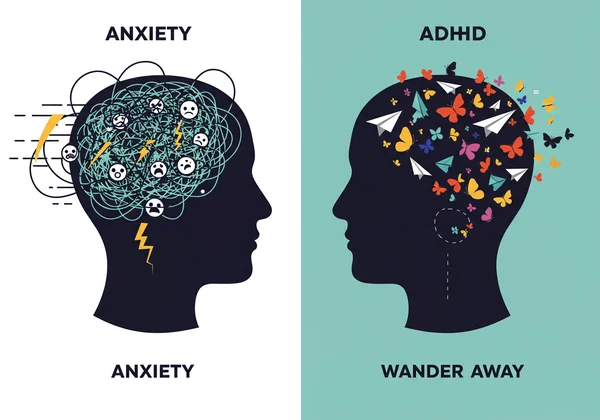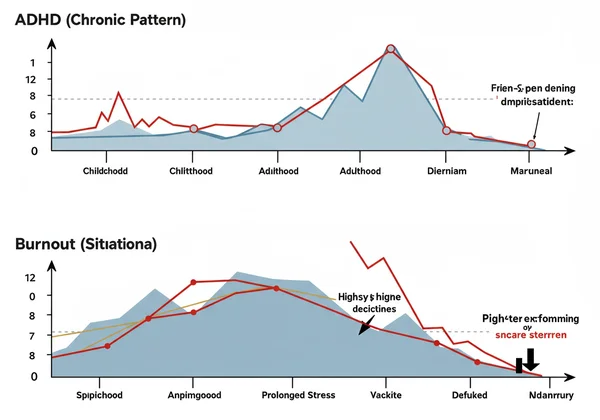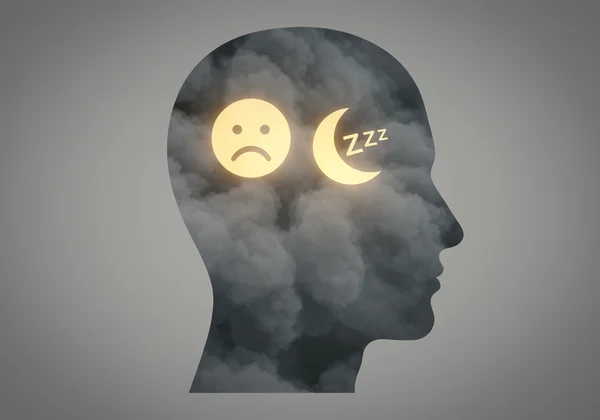What Feels Like ADHD But Isn't? An ASRS Test Perspective
August 17, 2025 | By Miles Harrison
Do you find yourself constantly distracted, disorganized, or struggling with motivation? It's easy to jump to conclusions and wonder if it's ADHD. But the truth is, what feels like ADHD but isn't can be caused by many other conditions that mimic its core symptoms. This guide will help you understand the key differences between ADHD, anxiety, burnout, and more, empowering you with the clarity you need to take your next step. Feeling uncertain is a common experience, and exploring these distinctions is a powerful first move toward self-understanding.
The modern world places immense demands on our attention and energy. It's no surprise that many of us feel scattered or overwhelmed. However, understanding the source of these feelings is crucial. Is it a lifelong pattern, or a reaction to recent stress? This guide will help you navigate these questions. If you're looking for a structured way to explore these patterns, a confidential online adhd screening can provide a valuable starting point for self-reflection. Remember, information is the first step toward clarity.
Understanding the Overlap: ADHD vs Anxiety
One of the most common points of confusion is the overlap between ADHD and anxiety. Both can make you feel restless and unable to focus, but they stem from very different places. Distinguishing between them involves looking at the why behind the symptoms, not just the what. This is a critical step in avoiding an ADHD misdiagnosis and finding the right path forward for your mental well-being.
The Core of the Struggle: Situational Worry vs. Neurological Wiring
At its heart, anxiety is an emotion rooted in worry and fear about future events. The inability to focus often comes from a mind preoccupied with "what-if" scenarios, replaying past conversations, or scanning for potential threats. It's a state of high alert that makes concentrating on a single task feel impossible.
ADHD, on the other hand, is a neurodevelopmental condition. Its challenges with focus and organization are tied to differences in the brain's neurological wiring, specifically its executive functions. The distraction isn't necessarily caused by worry, but by the brain's difficulty in filtering out irrelevant stimuli or sustaining mental effort on tasks that aren't inherently engaging. It’s a struggle with regulation, not just a reaction to fear.
Comparing Inattention: Is Your Mind Racing or Wandering?
To tell the difference, ask yourself what your mind is doing when it loses focus. Is it racing or is it wandering? A person with anxiety often experiences a racing mind, where thoughts are cyclical, fast-paced, and centered on worries. They might be trying to work, but their brain is simultaneously running a dozen stressful simulations.
In contrast, an inattentive mind with ADHD is more likely to wander. A sound outside the window, a random memory, or a sudden new idea can effortlessly pull focus away from the task at hand. The issue isn't an overwhelming sense of dread, but an inability to keep the "attentional spotlight" fixed where it needs to be. Gaining insight into your specific pattern of inattention is something an adult ADHD test can help clarify.

Restlessness vs. Fidgeting: The Motivation Behind the Movement
Both conditions can make it hard to sit still, but the internal drive is different. The restlessness of anxiety is often an overflow of nervous energy. It's the physical manifestation of internal turmoil—pacing while on the phone, bouncing a knee during a meeting, or feeling a constant urge to move to escape the uncomfortable feeling of being anxious.
The fidgeting common in ADHD serves a different purpose. It can be a way to release excess energy, but it's often a subconscious tool used to increase stimulation to help the brain focus. Tapping a pen, doodling, or shifting in a chair can provide just enough sensory input to prevent the mind from wandering off completely. It's a method for self-regulation, not just an expression of nervousness.
Is It Job Stress or More? ADHD vs Burnout
In today's demanding work culture, the lines between chronic stress, burnout, and ADHD have become increasingly blurred. Many professionals find themselves exhausted, cynical, and unable to perform at their peak, leading them to question if they have adult ADHD. However, ADHD vs burnout is a critical distinction to make, as the origins and solutions are vastly different.
The Onset of Symptoms: Chronic Patterns vs. Situational Exhaustion
The most significant clue is the timeline. ADHD is a lifelong condition, meaning the chronic patterns of inattention, impulsivity, or hyperactivity have been present since childhood, even if they weren't diagnosed or recognized as such. Think back: Did you struggle with similar issues in school, long before your current job?
Burnout, however, is situational. It's a state of situational exhaustion—emotional, physical, and mental—caused by prolonged and excessive stress. Its symptoms develop over time as a direct result of overwhelming workplace demands, a lack of support, or a values-mismatch. If your feelings of detachment and inefficiency are relatively new and tied strongly to your job, burnout is a more likely culprit.

Emotional State: Cynicism and Detachment in Burnout
While ADHD can cause frustration and low self-esteem due to constant struggles, burnout has a unique emotional state. Its hallmarks are deep cynicism, a feeling of detachment from your work and colleagues, and a pervasive sense of ineffectiveness. You may feel that your contributions don't matter and lose all passion for a job you once enjoyed.
An adult with ADHD might be frustrated by their inability to meet deadlines but may still be passionate about their work and ideas. The person experiencing burnout, however, feels emotionally drained and has lost their connection to their role. Understanding your emotional baseline is key. A preliminary ASRS test for adhd can provide data points to help you and a professional sort through these complex feelings.
Exploring Other Common Causes of ADHD-Like Symptoms
Beyond anxiety and burnout, several other conditions and factors can create symptoms that look like ADHD. It's important to consider these possibilities to get a complete picture of what might be affecting your ability to function at your best. This broadens your understanding and helps ensure you pursue the right kind of support.
The Impact of Depression on Focus and Motivation
Depression significantly impacts executive functions. The low mood and anhedonia (the inability to feel pleasure) it causes can drain your motivation, making it difficult to start or complete tasks. This can easily be mistaken for ADHD-related procrastination or inattention. Furthermore, "brain fog," a common symptom of depression, directly impairs focus and memory, mimicking the cognitive difficulties of ADHD. Exploring your symptoms with a tool like the adult adhd self-report scale can be a useful, private step.
How Poor Sleep Can Mimic Inattention
Never underestimate the power of sleep. Chronic poor sleep is one of the biggest culprits behind ADHD-like symptoms in adults who don't have the condition. Sleep deprivation directly impairs the prefrontal cortex, the part of the brain responsible for executive functions. Just a few nights of inadequate rest can lead to poor concentration, slowed thinking, and difficulty regulating emotions—all classic signs associated with ADHD. Before exploring other diagnoses, honestly assessing your sleep hygiene is a crucial and practical step.

Gaining Clarity on Your Symptoms
Understanding that many conditions can mimic ADHD is the first step toward getting the right support. Instead of guessing, you can gather specific data points about your own experiences. A structured screening tool provides a private, low-pressure way to see how your symptoms align with the established criteria for adult ADHD.
**Ready to take the next step? Take our free, confidential ASRS test. In just a few minutes, you'll receive a personalized, AI-driven report that can serve as a valuable resource for self-reflection or as a starting point for a conversation with a healthcare professional. Your journey toward clarity starts now.
Frequently Asked Questions
Do I have ADHD or am I just lazy?
This is a question rooted in stigma, not science. Laziness is a choice to avoid effort, whereas ADHD is a neurodevelopmental condition that makes regulating effort and attention incredibly difficult. People with ADHD often want to be productive but face invisible barriers in their brain's wiring. If you're consistently trying your best but still struggling, it's a sign of a real challenge, not a character flaw.
What are the main symptoms of ADHD in adults?
The main symptoms fall into two categories. Inattention includes difficulty sustaining focus, disorganization, forgetfulness, and losing things. Hyperactivity-Impulsivity includes feeling internally restless, fidgeting, talking excessively, interrupting others, and making hasty decisions without considering the consequences. An adhd self-assessment can help you see how these symptoms may apply to you.
Is it worth getting an ADHD diagnosis?
For many, the answer is a resounding yes. A formal diagnosis can validate lifelong struggles, provide access to treatments (like therapy or medication), and allow for accommodations at work or school. Most importantly, it fosters self-compassion and provides a framework for understanding yourself better. While there are costs and time involved, the clarity and support it brings can be life-changing. If you're considering it, the first step could be to take the asrs test online.